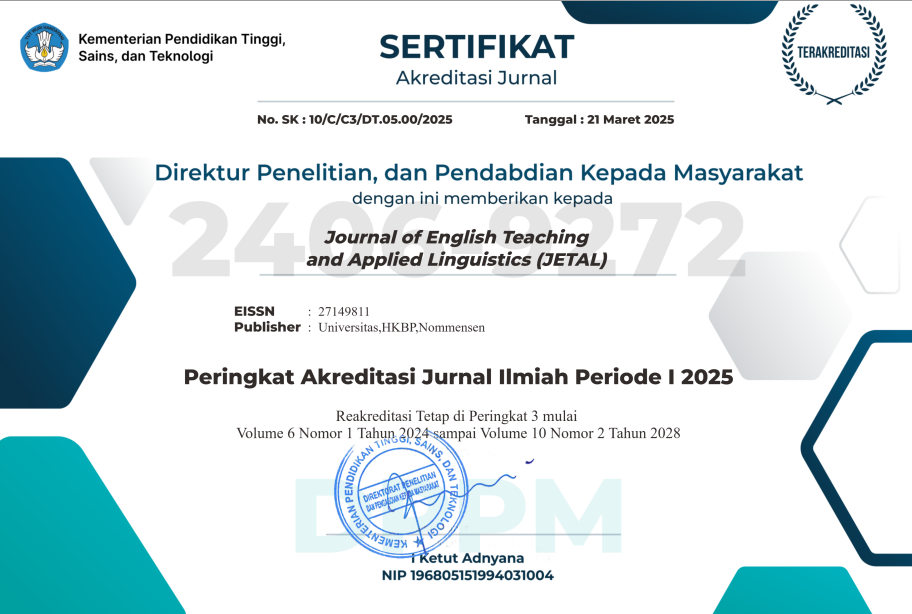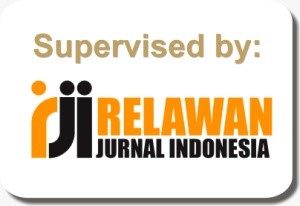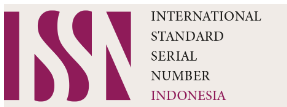The Effectiveness of Inquiry-Based Learning on Reading Skills at SMAN I Lembang: Kurikulum Merdeka
Abstract
A curriculum is one of the learning instruments that educational institutions must be completed. Indonesian educational system has its new curriculum called Kurikulum Merdeka aims to respond the challenges of education, which in its realization must support skills in critical thinking, problem-solving, creativity, and innovation, as well as communication and collaboration skills for students. Inquiry-Based Learning is one of the methods that help students to think critically, innovative, and creatively. The method used in this research is a quantitative method using an experimental design with a control and experimental group and a pre-test and post-test design. It used a purposive sampling technique to determine the samples that involved 68 students: 34 students in the experimental class and 34 students in the control class. The data were gained through tests. Then, the data were analyzed through SPSS 21. The significant findings of the recent study were the roles of IBL is to improve the reading skills of tenth-grade students at SMAN 1 Lembang.
References
Ariga, S. (2022). Implementasi Kurikulum Merdeka Pasca Pandemi Covid-19. Edu Society: Jurnal Pendidikan, Ilmu Sosial, dan Pengabdian Kepada Masyarakat Vol 2 No 2, Hal 662-670. EDU SOCIETY: JURNAL PENDIDIKAN, ILMU SOSIAL DAN PENGABDIAN KEPADA MASYARAKAT (permapendis-sumut.org)
Assingkily, M. S., Fauzi, M. R., Hardiyati, M., & Saktiani, S. (2021). Desain Pembelajaran Tematik Intergratif Jenjang MI/SD (Dari Konvensional Menuju Kontekstual yang Fungsional). Yogyakarta: K-Media.
Assingkily, M. S. (2021). Metode Penelitian Pendidikan: Panduan Menulis Artikel Imiah dan Tugas Akhir. Yogyakarta: K-Media.
Alberta. (2004). “Focus On Inquiry: A Teacher’s Guide to Implementing Inquiry-Based Learning”. Canada: Alberta Learning, Copyright.
Brown. H. Douglas (2003). “Teaching by Principles: An Interactive Approach to Language Pedagogy”. New York: Longman.
Balsigier, L. (2016). Reading comprehension-reading but understanding. Bend language and learning, p.1-2
Damanik, I. J., & Katemba, C. V. (2021). Netflix as a digital EFL learning aid for vocabulary improvement: College students’ perspective. ETERNAL (English, Teaching, Learning, and Research Journal), 7(2), 442-455.
Davis, B. (1992). Critical Thinking and Cooperative Learning: Are they Compatible? In R.Oxan (Ed.), Critical Thinking: Implications for Teaching and Teachers. Conference Proceedings of the New Jersey Institute for Critical Thinking Conference.
Ernawati., Yunus, N., & Pammu (2018). The Role of Inquiry Based Learning to Improve Reading Comprehension of EFL Students. ELS-JISH: ELS Journal on Interdiscplinary Studies on Humanities. Vol. 1 (1) p. 13-20.
Hebrank, M. (2000). Why inquiry-based teaching and learning in the middle school science classroom? Retrieved January 18 2016., from http://www.biology.duke.
Irawan. Y., & Sofyan. D. (2017). The Effect of Using Inquiry Based Learning Strategy On Students Speaking Ability (A Case Study at SMAN 7 Bengkulu Selatan). Journal of Applied Linguistic and Literature Vol 3. No.2 p 59-79.
Gulo. (2005). Strategi Belajar Mengajar. Jakarta: PT. Grasindo.
Katemba, C., V. (2019), Students’ Vocabulary Enhancement at Grade 10: A Comparative Study Using CALL & MALL in Indonesia. CALL-EJ, 20(1), 87-114. http://callej.org/journal/20-1/Katemba2019.pdf
Katemba, C.,V., & Samuel (2017). Improving Student’s Reading Comprehension Ability Using Jigsaw 1 Technique . Acuity : Journal of English Language Pedagogy, Literature and Culture Vol 2 No.2 2017. DOI : https://doi.org/10.35974/acuity.v2i2.613
Manalu, J. B., Sitohang, P., Heriwati, N., & Turnip, H. (2022). Pengembangan Perangkat Pembelajaran Kurikulum Merdeka. Journal Mahesa Research Center. 1(1), 80-86. https://doi.org/10.34007/ppd.vlil.174
Marfuah, S., Irsadi, A., dan Pamelasari, D, S. 2014.Pengembangan LKS IPA terpadu berbentuk Jigsaw Puzzle pada Tema Ekosistem dan Pencemaran Lingkungan di SMP Negeri 2 Margoyoso Kabupaten Pati.Unnes Science Education Journal. Vol. 3(2) : 528-534
Martinee-Lee & Duncan. (2015). A Master’s Level Research Methods Class: A Practice Example of Inquiry-Based Learning. Innovations in Higher Education Teaching and Learning, 3:173 – 189.
Nofiyanti, W, D., & Ismono. (2015). Pengembangan Lembar Kegiatan Siswa Berorientasi Problem Based Instruction untuk Melatihkan Keterampulan Berpikir Kritis Siswa pada Materi Beripikir Kritis Siswa pada Materi Pokok Laju Reaksi Siswa Kelas XI SMAN 15 Surabaya. Journal of Chemical Education. Vol. 4 (2) : 172-179.
Nugrohadi, S & Anwar, M.T. (2022). Pelatihan Assembler Edu untuk Meningkatkan Keterampilan Guru Merancng Project-based Learning Sesuai Kurikulum Merdeka Belajar. Media Penelitian Pendidikan: Jurnal Penelitian dalam Bidang Pendidikan dan Pengajaran. 16(1), 77-85.doi:http://dx.doi.org/10.26877/mpp.v16i1.11953
Sari. F., & Wati. I. (2017). Enhancing Students’ Reading Ability Through Inquiry Based Learning to EFL Students. English Community Journal, 1 (1): 60-64.
Sari, F., & Wahyuni, S. (2018). The Use of Clustering Technique to Improve the Students’ Skills in Writing Descriptive Paragraph. English Community Journal, 2(1): 167-174.
Sanjaya W. (2007). Strategi pembelajaran berorientasi standar proses pendidikan. Jakarta: Kencana.
Authors retain copyright and grant the journal right of first publication with the work simultaneously licensed under a Creative Commons Attribution-ShareAlike 4.0 International License (CC BY-SA 4.0) that allows others to share the work with an acknowledgment of the work's authorship and initial publication in this journal.
Authors are able to enter into separate, additional contractual arrangements for the non-exclusive distribution of the journal's published version of the work (e.g., post it to an institutional repository or publish it in a book), with an acknowledgment of its initial publication in this journal.
Authors are permitted and encouraged to post their work online (e.g., in institutional repositories or on their website) prior to and during the submission process, as it can lead to productive exchanges, as well as earlier and greater citation of published work (See The Effect of Open Access).






